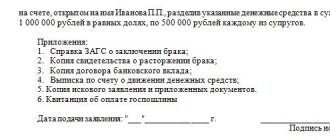From what moment is property considered common property?
Valuable items are recognized as jointly acquired property when purchased during the period from the moment of family registration until termination in the registry office or the entry into force of a court decision.
According to Art. 25 of the RF IC, the marriage union is considered annulled on the day of making entries in the registry office book, in case of divorce through the court - from the date the court decision becomes valid.
An exception is the purchase of an apartment with a mortgage before the marriage, if the loan was repaid after the wedding: here, monetary investments are made from the general budget, therefore, upon the application of the second spouse, the court recognizes it as community property.
What to do if there are no transaction documents?
If we consider cases where transactions were completed in a different way, for example, the buyer transferred cash to the seller, then it is very difficult to identify the funds as the defendant’s personal money.
In practice, in specific court cases, the following arguments have helped us:
- transactions were carried out simultaneously, that is, on one day.
This fact is confirmed in court by the marks of the state registration authority on the date of submission of documents, which coincides with both transactions. It would be nice if these transactions were accompanied by one realtor, who should be brought in as a witness in the case by submitting to the court the corresponding service agreement;
- money for the purchase of the disputed real estate could only be in the family from the sale of the defendant’s personal apartment, because During the marriage, neither the defendant nor the plaintiff had and could not have had income comparable to the amount necessary to purchase the disputed living space.
In this case, through the court, you can request information about the plaintiff’s income from the tax office or from the place of work - about wages during the marriage. You must simultaneously provide similar information about yourself. In such cases, it is psychologically justified, from the point of view of persuading the court, to ask the plaintiff how he explains the possibility of purchasing a shared apartment, in the absence of the necessary income from the spouses;
- both transactions were carried out by one trusted person.
For example, in a specific court case, the defendant said that the sale of a personal apartment and the purchase of the disputed living space was carried out by the defendant’s son (on his behalf), acting under a power of attorney issued by the defendant. In this case, in addition to the documents listed above related to the process of state registration of transactions, this power of attorney and documents confirming the flow of funds were provided as evidence: receipts of the authorized person for receiving money from the sale of the defendant’s personal apartment and for the transfer of money towards the purchase of the disputed . Since there was no evidence to refute this argument, the court found that the disputed property was acquired with funds received from the sale of the defendant's property.
Recognition of property as joint property
The procedure for recognizing things as jointly acquired is carried out in court at the request of an interested party. According to the law, the initiator is obliged to prove that the property was acquired during marriage.
The basis for filing a claim is the investment of funds or the family budget in order to increase the value of property acquired before the formation of the family, by inheritance or under a gift agreement.
How to prove that property is not common?
During the trial, defendants often have to prove that the property is their personal property. The main evidence is an extract from the Unified State Register of Real Estate, if we are talking about real estate. If it was purchased before the family was created and no investment was made by the initiator, the court will most likely refuse to satisfy the claim.
Evidence may include:
- bank statements indicating the fact of spending personal funds by the defendant;
- witness's testimonies;
- receipts and checks.
This is important to know: Error in a claim: how to correct it, sample
According to the law, personal belongings cannot be divided, and the court will refuse to separate them. Therefore, the defendant will not have to present evidence of the purchase of clothing or shoes at the expense of the initiator; they are not included in the total amount of the claim.
Sample statement of claim for recognition of personal property
Information on the results of a generalization of judicial practice in cases related to the protection of the rights of minors to real estate.
of the Family Code of the Russian Federation, the property of each of the spouses may be recognized as their joint property if it is established that during the marriage, investments were made at the expense of the common property of the spouses, or the property of each of the spouses, or the labor of one of the spouses, significantly increasing the value of this property ( major repairs, reconstruction, re-equipment and others). Based on the above and in accordance with paragraph 1 of Art.
In _____, a civil (Sharia) marriage was concluded between me and the defendant. From that time on, we began to live together and ran a joint household.
Division of common property through court
According to the law, two methods of division are allowed:
- through the court in case of disagreements;
- conclusion of an agreement by agreement.
You should go to court if there are disputes. The procedure looks like this:
- The initiator determines what will be divided, draws up and submits a statement of claim.
- The claim is accepted for proceedings within 5 days, the judge makes an appropriate ruling.
- The parties receive written notices with the date of the first meeting.
- In a magistrate's court, proceedings are resolved within one month, in a district court - two months.
- Based on the results, a court decision is made that determines the amount of shares or compensation.
You have 1 month to challenge the decision on appeal. After this, it comes into force and can be presented to Rosreestr for re-registration of shares or to other organizations to change owners.
Read more about division through the court here.
Jurisdiction and limitation period
The general statute of limitations is 3 years. The calculation begins from the moment the spouse learned of a violation of his rights or the possibility of division by law.
Contents of the statement
The claim must comply with the provisions of Art. 131 Code of Civil Procedure of the Russian Federation and contain the following data:
- name of the court;
- Full name of the defendant;
- property location address;
- Full name of the plaintiff;
- date of registration and divorce;
- demands for division;
- information about children;
- date of compilation and signature.
State duty
The amount of the duty is determined in accordance with Art. 333.19 of the Tax Code of the Russian Federation and depends on the amount of claims in thousands of rubles:
Arbitrage practice
The greatest disputes in the courts arise when dividing mortgaged property and loans.
After the divorce, the woman filed a claim for division, indicating a demand for payment of compensation for the share and leaving the loan obligations with the man. The defendant filed a counterclaim for the distribution of debt obligations according to the shares awarded as a result.
Reasons for refusing a claim
Theoretically, such a claim can be filed both before the divorce and after.
• Reason one: the statute of limitations has expired
Often, from the moment of divorce to the “epiphany” that it is possible to share someone else’s apartment, and the filing of a statement of claim in court, quite a lot of time can pass.
In such circumstances, the defendant, first of all, should pay attention to the statute of limitations, that is, the period for protecting the right to a claim (clause 1 of Article 196 of the Civil Code of the Russian Federation).
A statement about the expiration of the statute of limitations is an effective means of protection against attacks on one’s property and a very simple and “convenient” basis for the court to issue a judicial act denying the claim.
Such a statement allows you to make a lawful and informed decision without fear of a judicial error that may arise when examining other factual circumstances of the case.
But citizens should be warned against a fairly common mistake in this category of cases - calculating the statute of limitations from the date of divorce.
In fact, paragraph 1 of Art. 200 of the Civil Code of the Russian Federation, as a general rule, establishes that the limitation period begins from the day when the person learned or should have learned about the violation of his right and who is the proper defendant in the claim for the protection of this right.
If the second part of this formulation does not cause any difficulties in interpretation, then this cannot be said about the first. The first part assumes that the defendant is obliged to provide evidence indicating the specific date when the plaintiff learned about the dispute regarding the division of real estate or the determination of shares in it.
Let us note that from the moment the marriage ends, the plaintiff knows about the presence of the disputed real estate in the defendant’s property, as well as about his right to the division of this property, if it is jointly acquired.
But the very fact of this knowledge cannot become the basis for calculating the statute of limitations from the date of divorce, as evidenced by paragraph 6 of the Review of Judicial Practice of the Supreme Court of the Russian Federation No. 2 (approved by the Presidium of the Supreme Court of the Russian Federation on June 26, 2020).
According to clause 2 of the Civil Code of the Russian Federation, the limitation period is applied by the court solely at the request of the defendant, who must prove circumstances indicating the expiration of the limitation period (Article 56 of the Civil Procedure Code of the Russian Federation).
The legislation does not provide specific requirements for the form of an application for a statute of limitations: it can be submitted in writing or made orally before the court decision is made. If the statement is made orally, you must ask the court to record it in the minutes of the court hearing.
The law does not regulate how exactly the defendant will prove the expiration of the statute of limitations. But in all circumstances, written evidence is preferable.
This can be any correspondence between the parties, which indicates the plaintiff’s awareness of certain actions of the defendant. For example, a refusal to register a share in the former spouse’s name or to recognize his right to one in an apartment. Letters can be on paper or in electronic form (correspondence in instant messengers, email, social networks).
According to Art. 2 of the Federal Law of July 27, 2006 No. 149-FZ “On information, information technologies and information protection”, an electronic message is information transmitted or received by a user of an information and telecommunication network.
If statements, notifications, notices, demands or other legally significant messages entail civil consequences for a person, then such consequences appear from the moment the corresponding message is delivered to him (or his representative) (Clause 1 of Article 165.1 of the Civil Code of the Russian Federation).
In order for the electronic message to become conclusive evidence, it is better to contact a notary. Courts accept notarized records of inspection of storage media as written evidence.
As an alternative and cheaper option, you can use an inspection report of the information carrier with two witnesses who will confirm the information in court. For example, the presence in the email box of letters containing the necessary data, and their printout will be certified with signatures.
You can also provide the media themselves containing the required information. In this case, it will be examined directly by the court.
Along with the above, documents confirming that the plaintiff knew about his spouse’s intention to sell the apartment alone can be used as indirect evidence.
For example, this could be a request from the plaintiff for notarial consent to the alienation of an apartment, made during the marriage, and the subsequent refusal. In this case, the reason for refusal is considered to be a dispute between the spouses. As indirect evidence, documents may be provided to the court confirming the claim of the plaintiff against the defendant, which are related to the former’s lack of access to the apartment (if this happened as a result of the actions of the defendant creating obstacles).
Important! If you became aware of the ex-spouse’s intentions to file a claim in court before the fact of its filing, then the timely collection of the above-mentioned evidence of the expiration of the statute of limitations will help you win the case.
• Reason two: the property is the property of the defendant
“Iron” grounds for refusing a claim for division of an apartment as property acquired during marriage are circumstances when the real estate:
- acquired by the defendant before marriage;
- received as a gift during marriage;
- privatized without the plaintiff’s participation in the privatization;
- received by the defendant through other gratuitous transactions.
The courts are guided by the following rule of law: personal property is the property that belonged to each of the spouses before marriage, as well as property received by one of the spouses during marriage as a gift, by inheritance or through other gratuitous transactions (clause 1 of Art. 36 RF IC).
When claiming to divide the apartment, the plaintiffs either do not take these provisions into account, or they hope that the defendant will not be able to prove sole ownership of the property.
Although in practice, if documents are presented to the court that confirm the fact that donation transactions, privatization transactions, or a certificate of inheritance of an apartment have been completed in favor of the defendant, the other party’s claims will be denied.
Division of joint property by agreement
The agreement has a notarial form; the contents of the resolution, seal and signature of the notary are required. This is done to confirm the legal capacity of both parties and to avoid the execution of a contract under psychological or physical influence, or other grounds for invalidation due to violation of the rights of the husband or wife.
Drawing up an agreement is allowed in a marriage union, in divorce proceedings or after dissolution.
Read more about the features of the agreement section here.
Cost of an agreement with a notary
The notary's fee is determined by Art. 333.24 of the Tax Code of the Russian Federation and amounts to 500 rubles. Property is not subject to mandatory valuation; it is only required for legal proceedings. If the contract specifies the cost, it is determined by the spouses or a preliminary examination is carried out. In this case, the payment amount will be 0.5% of the price indicated in the expert report.
Contents of the agreement
The content of the agreement is not regulated by law. To avoid challenge, it must include the following information:
- Full name, registration addresses, passport details of the parties;
- dates of conclusion and dissolution of the union;
- information about the property: location, area, bank account details and cost;
- technical data of real estate;
- for a car: make, color, license plate, year of manufacture, model, VIN number;
- to whom and in what amount the values go.
According to the law, property is divided in half, or one party is paid monetary compensation. If a child remains with the spouse, the parties may provide for a clause to increase the size of the living space for her. If a minor has a share, it is not included in the agreement and remains with him. Accounts issued for a child are not divided.
How to prove the value of joint property
The value of the property can be confirmed by a cash receipt or sales receipt. Also, the price may be indicated in the property purchase agreement or warranty card. However, over time, the value of the property changes, usually downward. If a long period of time has passed since purchase, an assessment must be carried out. If property is divided voluntarily, the assessment can be entrusted to any expert institution. If the division of property takes place in court, you need to file a petition to appoint an expert examination. The court will issue an appropriate ruling, warn the expert about criminal liability for giving an unreliable opinion, and order an assessment.
Important! Proving cohabitation or separation is a rather complicated process. A separate publication is devoted to its description on our website.
Lawyer's answers to questions about jointly acquired property
Are donated items considered joint property during division?
Are shares considered generally held?
I won money in the lottery, and divorce proceedings have now begun. Will the money won be considered jointly acquired?
Is it possible to find out what property a spouse has?
Is a privatized apartment a shared apartment?
What should I do if, during the divorce and division, I found out that my spouse had money in the bank, but they did not participate in the division?
Will a mortgaged apartment purchased before marriage be considered a shared property if money was paid for it during the marriage?
What should we do if, before the divorce, my husband transferred our car, bought with family funds, to a friend?
How to properly divide a loan during a divorce?
- Obtain a certificate from the bank about the balance of the debt and the total amount.
- File a claim in court by presenting bank documents.
- Obtain a court decision and submit it to the bank if a representative of the financial institution was not present at the meetings. Based on this document, the loan agreement is reissued.
How to prove that an apartment purchased during marriage is the property of the defendant?
When filing a claim for the division of jointly acquired property, there is a presumption (initial assumption) that real estate acquired during the marriage is the common property of the spouses.
Therefore, it can be especially difficult to prove the opposite if, during the marriage, the defendant’s property was sold, and with the money raised from its sale, other real estate was purchased, which became the subject of the dispute.
The difficulty lies in the fact that the plaintiff’s argument: “the apartment was acquired during the marriage, therefore it is subject to division” is often nothing to refute, since there are no documents confirming the defendant’s sole ownership of it.
The optimal solution in this case would be the purchase and sale of real estate owned by only one spouse and the purchase of the disputed apartment by bank transfer. In this case, money from the buyer of personal real estate is transferred to the defendant’s account, after which it is transferred to the account of the seller of the disputed apartment.
In this case, the court is provided:
- contracts for the sale and purchase of personal and disputed apartments,
- document opening an account in the name of the defendant,
- bank statements that allow you to track the chain of payments.
It will help to prove the defendant’s ownership of the apartment and documents confirming that the funds from the sale of personal real estate were placed in a safe deposit box, which is rented simultaneously by two clients: the seller and the buyer of the apartment.
At the same time, the terms of the lease indicate the circumstances under which each of them has access to the cell.
For example, the buyer - subject to the provision of a real estate purchase and sale agreement with a note indicating the refusal to register the transaction, and the seller - upon provision of a purchase and sale agreement with a note regarding the registration of the transaction.
The defendant can provide the seller of the disputed apartment with the right to access the safe deposit box by issuing a power of attorney, which indicates the name of the bank, the address of the depositary, and the safe deposit box number. This payment procedure must be included in the terms of the purchase and sale agreement for the disputed apartment.
Court decision recognizing property as personal property of the spouse No. 2-2143/2017
IN THE NAME OF THE RUSSIAN FEDERATION
Kemerovo city July 11, 2020
Zavodsky District Court of Kemerovo
as part of the presiding Matveeva L.N.
under secretary Denisova T.V.,
having considered in open court a civil case on the claim of Mikhail Sergeevich Moskalev against Vera Nikolaevna Moskaleva for recognition of property as the personal property of the spouse,
This is important to know: Limitation period for subsidiary liability
Moskalev M.S. filed a lawsuit against V.N. Moskaleva. on recognition of property as the personal property of the spouse.
Requests to exclude real estate objects: a residential building and a plot of land located at the address: – a, from the jointly acquired property of the spouses; terminate the right of common joint ownership of Mikhail Sergeevich Moskalev and Vera Nikolaevna Moskaleva in relation to a residential building and land plot located at the address: recognize the plaintiff’s ownership of the specified property.
Plaintiff Moskalev M.S. did not appear at the court hearing, was promptly and properly notified of the date and time of the court hearing, and asked to consider the case with the participation of a representative.
The representative of the plaintiff Kerimova I.V., acting on the basis of a warrant (case file 28) and a written statement, at the court hearing supported the stated demands and the arguments set out in the statement, insisted on their satisfaction.
Defendant Moskaleva V.N. At the court hearing she did not recognize the claims and asked the court to refuse to satisfy them in full.
In accordance with Art. 167 of the Code of Civil Procedure of the Russian Federation, the court considers it possible to consider the case in the absence of the plaintiff, with the participation of his representative.
Having heard the explanations of the persons participating in the case, having examined the written materials of the case, the court considers the claims of Moskalev M.S. not subject to satisfaction due to the following.
According to Part 2 of Art. 218 of the Civil Code of the Russian Federation, the right of ownership to property that has an owner can be acquired by another person on the basis of a contract of sale, exchange, donation or other transaction on the alienation of this property.
The concept and grounds for the emergence of common property are enshrined in the provisions of Art. 244 of the Civil Code of the Russian Federation, according to which property owned by two or more persons belongs to them by right of common ownership (Part 1). Common property arises when two or more persons acquire property that cannot be divided without changing its purpose (indivisible things) or is not subject to division by force of law (Part 4).
According to Part 1 of Art. 34 of the Family Code of the Russian Federation, the joint property of spouses is property acquired by them during marriage.
In accordance with Part 2 of Art. 1 of the RF IC, marriages entered into only in civil registry offices are recognized.
By virtue of Part 2 of Art. 10 of the RF IC, the rights and obligations of spouses arise from the date of state registration of marriage in the civil registry office.
In accordance with Part 3 of Art. 244 of the Civil Code of the Russian Federation, common ownership of property is shared, except for cases where the law provides for the formation of joint ownership of this property.
From the contents of Part 1 of Art. 33 of the RF IC in conjunction with the norms of Part 2 of Art. 1, part 2 art. 10 of the RF IC it follows that the regime of joint ownership is the legal regime of the property of spouses whose marriage is registered in the prescribed manner.
At the court hearing it was established that on August 11, 2006. between Moskalev M.S. and Moskaleva V.N. a marriage was concluded, which was dissolved on December 13, 2016, which is confirmed by the decision of the magistrate of the judicial district No. 2 of the Zavodsky district of Kemerovo, certificate dated May 3, 2017. (case file 11).
The plaintiff believes that the specified property, namely the disputed residential building and land plot, is not jointly acquired property of the spouses, but is his personal property.
In support of his claims, the plaintiff points out that on May 2, 2006. in accordance with the apartment donation agreement (case sheet 12) Moskalev M.S. received ownership of an apartment located at the address: ., while 02/06/2014. the disputed apartment was sold under the apartment purchase and sale agreement dated 02/06/2014. (case sheet 13-16).
In support of his claims, the plaintiff points out that having received these funds, he paid with them for the purchase of the disputed house and land.
However, the court came to the conclusion that these circumstances do not constitute an unconditional basis for satisfying the claims in connection with the following.
By virtue of the law, any property can be recognized as the personal property of one of the spouses only if there are legal grounds for this, established by Art. 36 of the RF IC, the list of which is exhaustive.
To determine the regime of separate or joint ownership of property by spouses, it is necessary to establish the time (before marriage or during marriage) and the basis for the emergence of the right of ownership of specific property for each of the spouses, for what funds (personal or general) and under what transactions (compensated or gratuitous) property was acquired.
According to Art. 34 of the Family Code of the Russian Federation, property acquired by spouses during marriage is their joint property.
Resolving this civil dispute, the court came to the conclusion that the sale by Moskalev M.S of the apartment located in , in itself, does not indicate that the funds from its sale were spent by the plaintiff on the acquisition of the disputed property in full, while the dates coincided the sale of the plaintiff’s donated apartment and the purchase of the disputed real estate by the spouses cannot in this case be an unconditional basis for recognizing the disputed residential building and land plot as the personal property of the plaintiff Moskalev M.S.
Since the basis of the statement of claim is Moskalev M.S. indicates the direction of exclusively personal funds for the acquisition of disputed property on the basis of clause 1 of Art. 36 of the RF IC, the court considers the claims to be rejected due to the lack of legal grounds for this. The court came to the conclusion that in the framework of a civil dispute, the plaintiff Moskalev M.S. did not provide sufficient evidence to rebut the presumption of the total joint value of the property of the spouses acquired during the marriage, provided for in Art. 34 RF IC.
This is important to know: Claim for recalculation of heating fees
Assessing the relevance, admissibility, reliability of each evidence separately, as well as the sufficiency and mutual connection of all evidence presented by the parties and examined at the court hearing in their entirety, the court considers the claims for the exclusion of a residential building and a land plot located at the address: from the composition of joint property property of the spouses, termination of the right of common joint ownership, recognition of the property right of Moskaleva M.S. for real estate - are not subject to satisfaction in full.
Taking into account the above, the claims of Moskalev M.S. are not subject to full satisfaction.
In satisfying the claims of Mikhail Sergeevich Moskaleva to Vera Nikolaevna Moskaleva for the exclusion of a residential building and land plot located at the address: from the jointly acquired property of the spouses, termination of the right of common joint ownership, recognition of Mikhail Sergeevich Moskalev’s right of ownership of real estate objects, - refuse in full volume.
The decision can be appealed to the Kemerovo Regional Court within one month from the date the decision was made in final form.
The final court decision was made on July 14, 2017.
Presiding L.N. Matveeva
COURT DECISIONS ON THE DIVISION OF JOINTLY ACQUIRED PROPERTY:
Plaintiff Perminova M.V. filed a lawsuit against the defendant Perminov A.A. on the division of property of the spouses. The claims are motivated by the fact that she was married to the defendant Perminov A.A. from October 20, 2007 to October 2020. The solution is peace.
The parties were married to dd.mm.yyyy (case file 8). From the marriage they have minor daughters: Agupova S.A., born dd.mm.yyyy, and Agupova L.A., born dd.mm.yyyy. (case file 9, ). Agupov A.S. filed a lawsuit against V.S. Agupova. about the division.
An error occurred.
In support of the stated claims, the plaintiff refers to the fact that he was in a registered marriage with the defendant, during which the following property was purchased with joint funds: The specified car is registered in the name of Sh.. Currently, the car is used by the Defendant. In this regard, the plaintiff requests a division of jointly acquired property, which: allocate Sh. Defendant Sh.
Personal property of spouses is real estate, transport, money, valuables, rights of the recipient of benefits under various transactions that were acquired before marriage, regardless of the basis or during marriage. The fact of acquiring property before marriage is sufficient to confirm with title documents and even testimony of witnesses - if, taking into account the specifics of the thing, there is no corresponding documentation for it. Personal property is also considered to be things that each spouse acquired during marriage free of charge and through inheritance. The law considers, first of all, gifts as free transactions. To confirm such a transaction, a gift agreement can be provided, for example, real estate, securities or an amount over 3 thousand.
Objection to claims for division of jointly acquired property
Recognizing property as the personal property of one of the spouses is very important, because in this case, when dividing jointly acquired property, it will not be taken into account under Art. There are two options for recognizing such a right: voluntary through agreement and judicial if there is no consent of the other spouse. An agreement is a more convenient and cheaper option, but if it is not possible, then you need to go to court with a claim to recognize the property as personal. In this case, you need to prepare and present to the court convincing evidence confirming your words, then you can count on the fact that this property will be recognized as yours. The division of property between spouses is possible through an appropriate agreement, which is enshrined in Art. The agreement is drawn up in simple written form. In this case, it is advisable to have this document certified by a notary, although this is not necessary, but can play a positive role if the other party changes its mind about fulfilling it. This agreement can be entered into before, during or after marriage.
Recognition of property as personal property of a spouse
Spouses can divide joint property both during marriage and after its dissolution. If you can’t reach an agreement peacefully, you should file a lawsuit in court and see a sample. Only property belonging to the joint property of the spouses can be divided. Some types of property are considered personal and cannot be divided.
Look at the completed sample agreement on the division of marital property:. You can draw up a contract yourself or by contacting a lawyer. If you chose the first option and decided to draw up a separation agreement yourself, we recommend that you refer to the list presented below.
Statement of claim for division of marital property
The division of property of spouses is a complex procedure in terms of psychology, however, in itself, drawing up a statement of claim for the division of property is not particularly difficult; the main thing is to determine the composition of the joint property and submit claims to the court in a timely manner. Property includes things acquired by spouses during marriage. What was bought before marriage or received as a gift or inherited by one of the spouses cannot be divided.
Khimki, Novokurkino, st. Molodezhnaya, d. The Judicial Collegium for Civil Cases of the Moscow Regional Court, having considered in open court appeals against the decision of the Krasnogorsk City Court of the Moscow Region in the case of the claim of B. In support of the stated requirements, he indicated that with Ch. During the marriage, it was acquired the disputed apartment, which was bought with the plaintiff’s personal funds, proceeds from the sale of property belonging to him before marriage.
Acceptance and consideration of an application for division of property by the court
After filing an application for division of property, the court decides on its acceptance within 5 days
If you find any deficiencies in your claim, please note:. After accepting the application, the court notifies the plaintiff and defendant about the time and place of preparation for the case, and if the case is very simple, then about the court hearing
After accepting the application, the court notifies the plaintiff and defendant about the time and place of preparation for the case, and if the case is very simple, then about the court hearing.
During the preparation, the court will ask the defendant to present his version of the division, judgments regarding the value of the property and invite the parties to agree peacefully.
If the defendant disagrees with the value of the joint property determined by the plaintiff, the court will try to bring the parties to an agreement; if this is not reached, a forensic examination will be ordered. In this case, the payment for the examination is borne by the defendant.
Based on the results of the consideration of the case, the court makes a decision, which can be appealed within 1 month, after which it will enter into legal force and be enforced.
Evidence for recognition of personal property of spouses as common property
Since the basis for recognizing property as joint is its improvement and increase in value, then these circumstances will have to be proven.
The court accepts for consideration any written evidence:
- Checks.
- Estimates.
- Work acceptance certificates.
- Receipts.
- Payment documents.
- Witness's testimonies.
- Conclusions of expert commissions.
The court will proceed from the actual value of the property, taking into account the following circumstances:
- The prevailing price for building materials in a given district (if repairs were made to the real estate).
- Market prices of transport services.
- Market value of the property.
- The degree of improvement of the property.
- Possibility of use.
In court, it is necessary to provide comprehensive information about the original and current value of the property. Since it is precisely the circumstance of its significant improvement that is taken into account.
USEFUL INFORMATION: How to divide an apartment purchased with maternity capital during a divorce
It should be taken into account that the legislation has definitions of what relates to major repairs and reconstruction (departmental building standards VSN 58-88 (r) “Regulations on the organization and implementation of reconstruction, repair and maintenance of buildings, communal and socio-cultural facilities”) .
Thus, standards have been established for determining the extent of work performed and their category. It remains to prove the amount of investment in property improvement.
The situation is more complicated if a spouse demands a share in an enterprise owned by the other spouse as personal property. According to Art. 34 of the RF IC, the income of the enterprise will be joint property. If the income is significant and is aimed at further activities of the enterprise, increasing the value of the shares, then this may be the basis for receiving a share.







